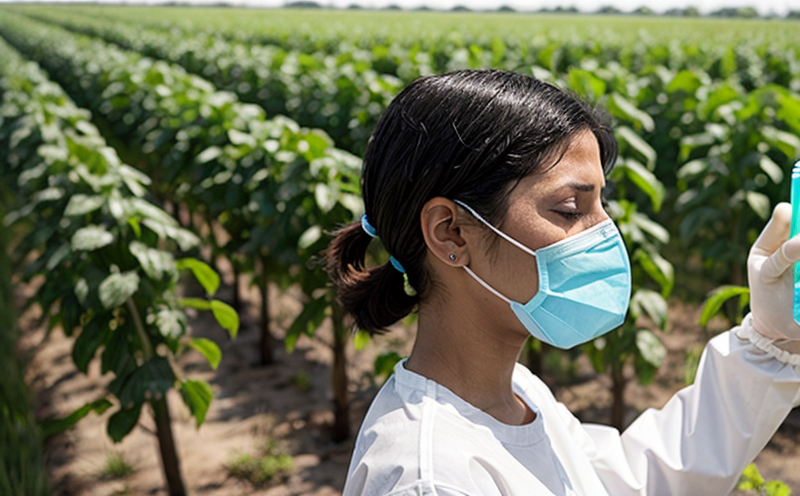ISO 28541 Persistent Organic Pollutants POPs in Environment Test
The ISO 28541 standard is a critical tool for laboratories focused on the analysis of persistent organic pollutants (POPs) within environmental samples. POPs are toxic chemicals that can remain stable and accumulate over time, posing significant risks to human health and ecosystems.
This test plays a pivotal role in ensuring compliance with international regulations such as those outlined by the Stockholm Convention, which aims to eliminate or reduce the release of certain persistent organic pollutants into the environment. The standard provides methodologies for detecting trace amounts of these pollutants in various environmental matrices including soil, water, air, and biota.
The testing process involves several key steps: sample collection, preservation, transport, and preparation; extraction using appropriate solvents or other methods; purification if necessary to ensure accurate quantification; and finally, the analysis itself which can be conducted via gas chromatography/mass spectrometry (GC/MS) among others depending on the specific POPs being targeted.
It's important to note that the sensitivity levels required by this standard are extremely high due to the nature of POPs. For instance, some pesticides like DDT have half-lives measured in decades, meaning they persist long after their intended use has ended. Therefore, even minute quantities can have substantial impacts if not properly addressed.
The results from such tests are crucial for environmental monitoring programs designed to track the presence and concentrations of POPs over time. This information is vital for governments, policymakers, and industries alike who must make informed decisions regarding pollution control measures or adjustments in agricultural practices.
Understanding the implications of these findings also extends beyond just compliance purposes; it helps foster a greater awareness among stakeholders about the long-term effects of certain chemicals on both terrestrial and aquatic life forms. By identifying hotspots early, proactive steps can be taken to mitigate potential harm before irreversible damage occurs.
In summary, adhering to ISO 28541 ensures reliable data that supports effective management strategies against POPs pollution while contributing towards global efforts aimed at protecting our planet's natural resources and biodiversity.
Industry Applications
| Application Area | Description of Use |
|---|---|
| Environmental Monitoring Agencies | Conduct regular audits to ensure compliance with international agreements. |
| Agricultural Companies | Analyze soil and water samples from farms suspected of contamination. |
| Pharmaceutical Manufacturers | Detect trace amounts of unwanted byproducts in manufacturing processes. |
| Pesticide Formulators | Evaluate new formulations for unintended side effects on wildlife. |
| Water Treatment Facilities | Screen incoming feedstock and treated effluents for residual pollutants. |
| Academic Institutions | Conduct research into the behavior and fate of POPs in different environments. |
EuroLab Advantages
EuroLab stands out as a leader in providing ISO 28541 compliant tests for persistent organic pollutants (POPs) across various environments. Our expertise lies not only in delivering accurate results but also ensuring that our methodologies align perfectly with current scientific knowledge and best practices.
Our state-of-the-art laboratory facilities are equipped with advanced analytical instruments capable of detecting even the smallest traces of POPs, making us uniquely positioned to offer robust solutions for environmental testing needs. This precision is further enhanced by our experienced team of chemists who possess deep understanding of both theoretical aspects and practical applications related to this field.
We pride ourselves on maintaining high standards through continuous quality assurance procedures and rigorous internal audits. Additionally, we stay abreast of any updates or changes in relevant international standards like ISO 28541 so that our services remain up-to-date and reliable.
Our commitment to excellence extends beyond mere technical capabilities; it encompasses a dedication to customer satisfaction by offering personalized service tailored specifically to individual clients' requirements. Whether you need routine testing or one-off assessments, we ensure efficient turnaround times without compromising on accuracy or reliability.
Environmental and Sustainability Contributions
The work done at EuroLab contributes significantly towards environmental protection initiatives by providing reliable data that guides decision-making processes aimed at minimizing POPs pollution. By identifying sources of contamination early, appropriate actions can be taken to prevent further spread or degradation of affected areas.
This not only helps in achieving regulatory compliance but also promotes sustainable development practices within industries and communities alike. For example, by detecting low levels of pesticides in water supplies, corrective measures can be implemented promptly preventing widespread poisoning incidents that could otherwise occur if left unchecked.
Moreover, our research efforts contribute to better understanding of POPs behavior under different conditions which is essential for developing more effective mitigation strategies. This knowledge base informs future policies and practices aimed at reducing overall environmental impact associated with these harmful substances.





